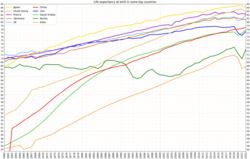Life expectancy
Life expectancy is how long a person is expected to live. It is based on many factors such as country and life style including smoking, diet, and exercise.
There are great changes in life expectancy between different parts of the world, mostly caused by differences in public health, medical care and diet. Much of the excess mortality (higher death rates) in poorer nations is due to war, not enough food, and medical conditions or diseases (AIDS, Malaria, etc.).
Life expectancy has generally improved since records started, in both healthy people and those with chronic or critical illnesses or defects.
However, over the past 200 years, countries with black or African populations have generally not had the same improvements in mortality rates other peoples have had. Even in countries with a majority of white people, such as USA, Britain, Ireland and France, black people tend to have shorter life expectancies than their white counterparts. For example, in the U.S. white Americans are expected to live until age 79, but African Americans only until age 75 (as of the year 2013).
Climate may also have an effect, and the way data is collected may also influence the figures. According to the CIA World Factbook, Macau has the world's longest life expectancy of 84.4 years.
There are also significant differences in life expectancy between men and women in most countries, with women typically outliving men by around five years. Economic circumstances also affect life expectancy. For example, in the United Kingdom, life expectancy in the expensive areas like Kensington is several years longer than in the poorest areas such as Glasgow.[1] This may reflect factors such as diet and lifestyle as well as access to medical care. It may also reflect a selective effect: people with chronic life-threatening illnesses are less likely to become wealthy or to live in expensive areas.[2]
The COVID-19 pandemic reduced life expectancy in Europe by more than a year. [3]
Life Expectancy Media
Life expectancy and healthy life expectancy in various countries of the world in 2019, according to WHO
Life expectancy in 1800, 1950, and 2015 – visualization by Our World in Data
Graphs of life expectancy at birth for some sub-Saharan countries showing the fall in the 1990s primarily due to the HIV pandemic
References
- ↑ The Guardian 20.10.2011
- ↑ Department of Health -Tackling health inequalities Archived 2007-02-05 at the Wayback Machine: Status report on the Programme for Action
- ↑ "Life expectancy at birth down to 80.1 years in 2021 - Products Eurostat News - Eurostat". ec.europa.eu. Retrieved 2023-03-16.








